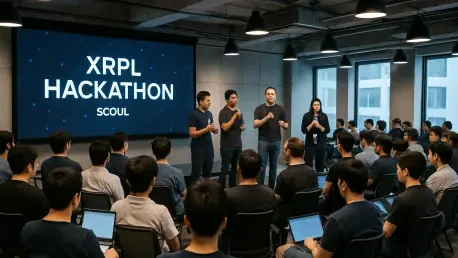South Korea has swiftly positioned itself as a dominant force in the global fintech landscape, driven by an unparalleled fusion of technological prowess and blockchain innovation that is reshaping the future of financial services across the world. At the heart of this dynamic shift stands the XRPL Hackathon Seoul 2025, a transformative event sponsored by Ripple that goes beyond a mere coding challenge to act as a springboard for revolutionary ideas in payments, settlements, and financial models. Held over two days, this gathering unites developers, entrepreneurs, and corporate teams to harness the power of the XRP Ledger (XRPL), spotlighting the nation’s determination to lead in digital finance. This surge is no accident; it stems from a carefully crafted ecosystem of regulatory clarity, cultural readiness, and strategic investments, all of which converge to make South Korea a trailblazer. The hackathon serves as a vivid illustration of how blockchain technology is not just an abstract concept but a practical tool for solving real-world financial challenges in this tech-forward nation.
Regulatory Framework: Building Trust and Innovation
A Solid Foundation for Blockchain Growth
South Korea’s ascent in fintech is underpinned by a robust regulatory environment that strikes a delicate balance between fostering innovation and ensuring consumer safety, setting a benchmark for others to follow. Key legislation, such as the General Act on Digital Assets and the Virtual Asset User Protection Act (VAUPA), has been instrumental in legitimizing blockchain applications like stablecoins while enhancing transparency across the market. These policies have emboldened major financial institutions, including KB Kookmin and Shinhan Bank, to explore and integrate blockchain solutions into their operations. By creating a predictable and supportive legal framework, the government has instilled confidence among businesses and investors, paving the way for widespread adoption. This clarity not only mitigates risks but also positions South Korea as a trusted hub for fintech development, where cutting-edge ideas can flourish without the shadow of regulatory uncertainty looming over them.
The impact of this regulatory foundation extends beyond mere compliance to actively shaping the fintech ecosystem into a global leader. With stablecoins now recognized under the law, financial entities are innovating at an accelerated pace, developing digital assets pegged to the Korean won that bridge traditional banking with emerging technologies. This legal backing has also spurred the exploration of spot ETFs and other blockchain-based financial products, drawing international attention to South Korea’s progressive stance. Moreover, the emphasis on transparency ensures that consumer trust remains high, a critical factor in the adoption of digital finance solutions. The nation’s ability to align innovation with protective measures demonstrates a forward-thinking approach that other countries are beginning to emulate. This regulatory model serves as a catalyst, enabling both established firms and startups to push boundaries in a secure environment, thereby reinforcing South Korea’s position at the forefront of the global fintech revolution.
Government Investments and Sandboxes
The commitment of the Financial Services Commission (FSC) to fintech growth is evident through substantial financial backing, with over $575 million allocated to the digital asset ecosystem from earlier years through 2027. This investment underscores a strategic vision to nurture an environment where blockchain and digital finance can thrive. Beyond funding, regulatory sandboxes have been established as controlled spaces where companies can test novel ideas without the immediate burden of full regulatory oversight. These sandboxes allow for real-world experimentation, ensuring that innovations are both practical and scalable before they hit the broader market. Such initiatives reflect a governmental approach that prioritizes long-term growth over short-term gains, fostering a culture of calculated risk-taking.
In addition to sandboxes, open banking policies have further fueled South Korea’s fintech momentum by encouraging collaboration between traditional financial institutions and tech-driven startups. This framework enables seamless data sharing and integration, allowing for the development of user-centric financial services that meet modern demands. The FSC’s proactive measures ensure that both emerging companies and established players have the resources and freedom to innovate, creating a vibrant ecosystem where new solutions can be refined and deployed effectively. This level of institutional support not only accelerates the pace of technological advancement but also attracts global talent and capital, eager to tap into a market that is supported at the highest levels. South Korea’s investment in digital finance infrastructure is a clear signal of its ambition to remain a leader in shaping the future of global financial systems.
Grassroots Innovation: XRPL Hackathon as a Catalyst
Collaboration and Practical Solutions
The XRPL Hackathon Seoul 2025 emerges as a powerful engine for grassroots innovation, uniting a diverse array of participants under the compelling theme “Built For Fintech” to tackle pressing financial challenges. This event brings together coders, business minds, and corporate teams to develop actionable solutions using the XRP Ledger, focusing on areas like cross-border payments and asset tokenization. Its unique structure fosters inclusivity by pairing non-technical founders with skilled developers, effectively lowering barriers to entry for those with visionary ideas but limited technical expertise. This collaborative approach sparks creativity, ensuring that the resulting innovations are not only technologically sound but also grounded in real-world applicability. The hackathon’s emphasis on diversity in thought and skill sets amplifies its impact, making it a melting pot of ideas that could redefine financial interactions on a global scale.
Beyond fostering teamwork, the event prioritizes the creation of practical tools that address immediate needs within the fintech sector, setting it apart from purely theoretical exercises. Participants are encouraged to focus on solutions that can streamline complex processes, such as international settlements, which often suffer from high costs and delays. By leveraging the efficiency of XRPL, these teams develop prototypes that demonstrate blockchain’s potential to revolutionize traditional systems. The hackathon’s environment of rapid ideation and feedback ensures that concepts are rigorously tested and refined within a short timeframe. This focus on tangible outcomes highlights South Korea’s commitment to not just dreaming up futuristic technologies but actually building them. Such initiatives underscore the nation’s role as a testing ground for innovations that could soon become standard practices in global finance.
Pathways to Commercialization
The XRPL Hackathon Seoul 2025 offers more than just a platform for innovation; it provides a direct route to commercialization with a $10,000 prize pool that incentivizes high-quality output from participants. Winners gain not only financial rewards but also the opportunity to present their projects at the XRP Seoul 2025 conference, a significant stage for connecting with global venture capital firms and accelerators. This exposure is invaluable, transforming promising prototypes into market-ready products with the potential for widespread adoption. The event’s design ensures that innovative ideas don’t remain confined to a workshop but are given the resources and visibility needed to scale, aligning with South Korea’s broader goal of turning creativity into economic value.
Furthermore, the hackathon’s integration with international networks through Ripple’s sponsorship amplifies its role as a launchpad for fintech entrepreneurs looking to make a global impact. Participants benefit from mentorship and partnerships that guide them through the complexities of turning a concept into a viable business. This structured pathway from ideation to investment is a testament to the event’s strategic importance in the fintech ecosystem. It bridges the gap between small-scale innovation and large-scale implementation, ensuring that groundbreaking solutions reach the audiences and markets that need them most. South Korea’s focus on facilitating such transitions through events like this hackathon cements its reputation as a hub where fintech dreams can become reality, attracting talent and investors from around the world.
Cultural and Technological Edge
Mobile-First Mindset
South Korea’s deep-rooted mobile-first culture serves as a critical enabler for its fintech dominance, with digital payment platforms like Kakao Pay and Toss commanding a significant share of everyday transactions across the country. This widespread reliance on mobile technology, coupled with the growing popularity of QR code payments, reflects a society that is not just comfortable with digital solutions but actively embraces them. Such readiness creates an ideal environment for the rapid adoption of blockchain-based financial tools, as consumers are already primed for seamless, tech-driven experiences. The integration of fintech into daily life is evident in how effortlessly South Koreans navigate cashless transactions, positioning the nation as a fertile ground for testing and scaling new digital finance innovations that could set global benchmarks.
This cultural inclination toward mobile technology also drives demand for user-friendly fintech applications, pushing developers to prioritize accessibility and convenience in their designs. The high penetration of smartphones ensures that even complex blockchain solutions can reach a broad audience through intuitive interfaces. Government and private sector initiatives further amplify this trend by promoting digital literacy and infrastructure, ensuring that no segment of the population is left behind in the fintech wave. As a result, South Korea stands out as a market where technological advancements are not just implemented but are deeply woven into the fabric of society. This unique blend of cultural acceptance and technological infrastructure makes the country a leader in fintech adoption, with lessons that other nations could adapt to accelerate their own digital transformations.
Startup Innovation
South Korean startups like Blocko and Kaia Blockchain are at the forefront of leveraging the nation’s tech-savvy environment to pioneer blockchain solutions that bridge the gap between traditional finance and digital assets. By developing stablecoins pegged to the Korean won, these companies are creating tools that facilitate smoother transitions into digital economies while maintaining familiarity for users accustomed to conventional currencies. Their work exemplifies how local innovation can address global challenges, such as the need for efficient and secure financial systems. Supported by a culture that values technological progress, these startups are not just surviving but thriving, often in collaboration with international partners who recognize South Korea’s potential as a fintech incubator.
The success of these startups is further fueled by access to a highly connected and digitally literate consumer base, which allows for rapid feedback and iteration on new products. This dynamic environment enables companies to test blockchain applications in real-time, refining them to meet market needs with precision. Additionally, the government’s supportive policies and investment in digital infrastructure provide these firms with the resources needed to scale their operations beyond national borders. South Korea’s startup ecosystem thus serves as a powerful engine for fintech growth, producing solutions that could redefine financial interactions worldwide. The focus on practical, user-centric innovation ensures that these emerging players contribute significantly to the nation’s reputation as a global leader in digital finance.
Investment Opportunities in Fintech
A Lucrative Market for Investors
South Korea’s fintech sector presents a compelling case for investors, with initiatives like the XRPL Japan and Korea Fund offering grants, partnerships, and startup investments to fuel growth in this vibrant market. The stablecoin market alone is projected to reach a staggering $1.5 trillion by 2027, signaling immense potential for high returns. High-valuation companies such as Toss, valued at $7.4 billion, and Kakao Mobility at $6.5 billion, are already drawing significant domestic and international capital, underscoring the sector’s attractiveness. This financial landscape is ripe with opportunities for those looking to invest in both established players and innovative newcomers, positioning South Korea as a prime destination for fintech-focused portfolios seeking substantial growth.
The allure of South Korea’s fintech market is further enhanced by its strategic alignment with global trends in digital assets, making it a hotspot for forward-thinking investors. Government policies that support blockchain adoption, combined with a culture that rapidly embraces new technologies, create a low-risk, high-reward environment for capital deployment. The presence of structured funds and events like the XRPL Hackathon ensures that investors have access to a pipeline of cutting-edge projects with real-world applications. This synergy of policy, innovation, and market readiness amplifies the potential for lucrative exits, whether through acquisitions or public offerings. For venture capitalists and institutional investors alike, South Korea offers a unique blend of stability and opportunity that is hard to replicate elsewhere in the global fintech arena.
Emerging Niches and Global Reach
Hackathon projects emerging from events like XRPL Seoul 2025 highlight promising investment niches, particularly in payment systems and AI-driven blockchain tools that address specific pain points in financial services. These early-stage innovations often reveal untapped markets, offering investors the chance to get in on the ground floor of potentially disruptive technologies. With corporate crypto trading accounts now legalized, South Korea has opened new avenues for institutional participation, further broadening the investment landscape. This progressive stance enhances the nation’s appeal as a global leader, attracting funds from across the world eager to capitalize on the next big fintech breakthrough.
The global reach of South Korea’s fintech innovations adds another layer of attractiveness for investors looking to diversify their portfolios with high-growth opportunities. Projects born out of hackathons and supported by funds like the XRPL Japan and Korea Fund often gain international traction, thanks to partnerships and mentorship programs that connect local talent with global markets. This cross-border potential ensures that investments in South Korean fintech are not limited to domestic success but can scale to influence worldwide financial systems. The combination of emerging niches and a supportive ecosystem for global expansion makes South Korea a standout choice for those aiming to back the future of finance. As blockchain continues to integrate with traditional systems, the investment prospects here are poised to grow exponentially.
Shaping the Future of Digital Finance
Reflecting on South Korea’s remarkable fintech journey, the XRPL Hackathon Seoul 2025 proved to be a defining moment that showcased the nation’s capacity to innovate at both grassroots and institutional levels. The event, alongside robust regulatory frameworks and substantial government investments, highlighted how a strategic blend of policy and technology could drive a sector forward. Major banks embraced blockchain, startups flourished with groundbreaking solutions, and investors found fertile ground for substantial returns. Looking ahead, the focus should shift to sustaining this momentum by scaling successful hackathon projects through increased funding and international collaboration. Policymakers might consider further refining regulatory sandboxes to accommodate evolving technologies, while investors could prioritize emerging niches like AI-blockchain integrations. South Korea’s path offers a blueprint for other nations, demonstrating that aligning innovation with supportive ecosystems can redefine global finance for years to come.









